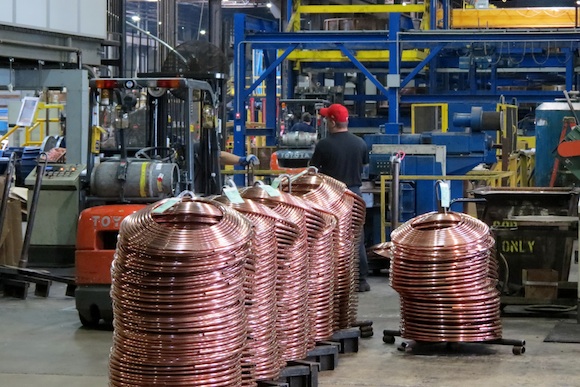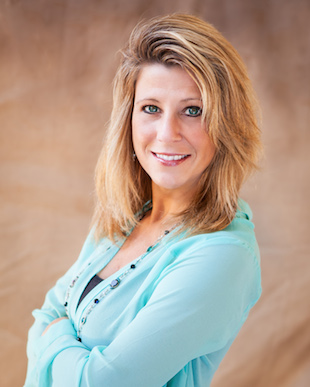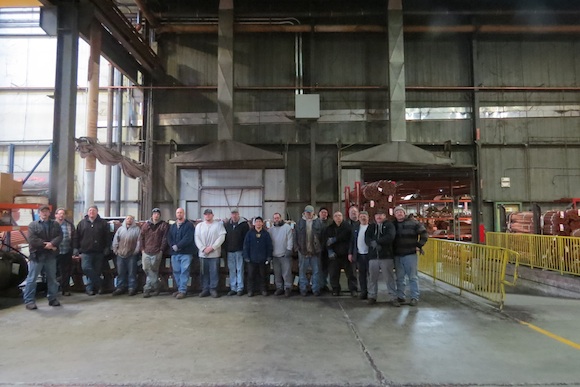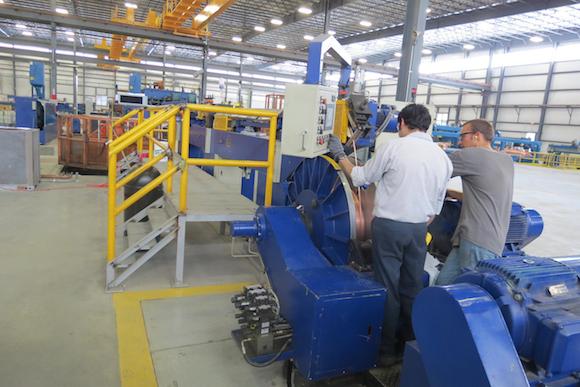Years ago, when Andi Funk's employer pushed her to move from business development to manufacturing finance, she went “kicking and screaming.” But soon she had caught the manufacturing bug.
“I thought it was going to be boring,” recalls Funk. “But it wasn't. Manufacturing is exciting. You can tangibly see and touch the product. There are intellectual challenges. You can really make a difference.”
Last August, Andi Funk became CEO of Reading's Cambridge-Lee Industries, a growing manufacturer of copper products. Now this experienced executive is leading the company into the future with cutting-edge technology, innovative funding and a focus on customer service.
Tell us about Cambridge-Lee?
We are a copper-focused manufacturer and distributor for the plumbing, HVAC, industrial and OEM [original equipment manufacturer] markets. We have about 450 employees, three sales divisions and five plants, all based in our Reading, PA, facility.
About a third of the business is our industrial metals division. In that division, we distribute products — half are sourced by third-party partners and half are manufactured by our parent company IUSA. So, we buy and resell copper-focused products, mostly to OEM businesses. The relationship with IUSA gives us an advantage over other distributors in that we are able to develop enhancements and customize production capabilities to meet our customers’ needs. The other two thirds of our business is copper tubing, all of which we manufacture here in the United States. We sell to plumbing wholesalers for mostly commercial uses, as well as some residential. We've been in that business for over 50 years and have about 25 percent of the U.S. market share.
The new initiative that we have — which is very exciting — is to grow our presence in the industrial OEM market. It's copper tubing for the HVAC market, and instead of selling through plumbing wholesalers, it's made-to-order to customer specifications. It's much more high-tech, high-precision.
And it requires a different manufacturing process. For the plumbing market, we purchase scrap copper, melt and refine it, and use an extrusion process (kind of like when you take a piece of Play-Doh and put it through a press to make a tube). If the mandrel isn't perfectly centered, you can have some eccentricity and the hole in the tube won't be perfectly centered. With industrial OEM, we need much tighter specifications — these products are being used in evaporator and condensor coils in HVAC systems, where you need much thinner walls and much tighter tolerances.
In 2007, IUSA, which is based in Mexico, commissioned a brand new world-class copper tube plant to enter this market using the latest technology (called “cast-and-roll”). This equipment has long lead times — two years or so — and just as they had the equipment, had it installed, and were starting the plant up, an antidumping suit was filed against the importation of copper tubes from Mexico. The plant was mothballed.
So, in 2011, we petitioned to move the whole plant here to our Reading compound. We just started up this new plant — it will create about 250 jobs in Berks County. Right now it's a small part of our business, but it has potential for significant growth.
It seems that a lot of the current manufacturing successes in the U.S. are in custom, high-tech and high-skill production.
Yes, and the other thing impacting repatriation of production to the U.S. is freight. With copper tubes, the metal has the highest value in the product. Whether you're making the copper tubes in China or the U.S., that's not going to change. The only cost that's going to change significantly is the labor cost, which would be offset by the cost of shipping. On top of that, [there is] exposure to both theft and fluctuations in commodity prices. The crazy market we've had in terms of commodity prices combined with rising fuel costs and transportation costs — and the diminishing margin between emerging market labor and U.S. labor — [gives us an advantage].
How did you end up at Cambridge-Lee?
I was an accounting major at Villanova. I started with public accounting, got my CPA. Later, I started working in mostly finance roles — operational finance — then went back and got my MBA from The Wharton School. After Wharton, I was at Arrow International, a medical device company. There I settled into the manufacturing finance area. I hadn't been that interested in going into it — I wasn't interested in being a cost accountant — but it was a much more strategic role. We were able to really shape behavior and improve results.
I went from there to Carpenter Technology, a publicly-traded steel company just down the street. That got me into the metals market. It was a similar role to what I had at Arrow — more of a business partner than an accountant. I came to Cambridge-Lee a little over three years ago as the CFO with the ultimate intention of, when the CEO retired, stepping into that role. That happened in August, and it's been very rewarding.
Can you talk a little about being a Pennsylvania-based company? What resources are available to you?
Ben Franklin Technology Partners of Northeastern Pennsylvania has been a great partner to us. We've worked on a couple projects with them, and we're just about to embark on another. Especially as we're looking at more productivity and technology improvement — when you want to try to have some game-changers — they've been a great resource.
Locally, we've also used the Greater Reading Economic Partnership, especially when we've got an initiative and we're not sure where to get started. They've been fantastic at connecting the dots. When we explored the option of putting in a railroad spur — who should we talk to? They know just who to go to.
We also have the support of the Governor's Action Team (GAT). The Greater Berks Development Fund helped Cambridge-Lee secure $7 million in direct state funding through GAT for capital expenditures to help to make our expansion a reality. They came out to help look at the [plant] project and gave us some tax credits and some funding. And they introduced us to CanAm Enterprises, an organization that administers the federal EB-5 program for PA.
CanAm was an excellent partner to work with, and might be useful to mention for other companies. We were able to get the bulk of the cost of this plant relocation paid for through EB-5 funding — off-shore independent investors put money into a job-creating project for a very small return. Then, as long as they meet all the criteria and pass the background screening, they get expedited visa qualification. So, Chinese investors were able to get visas quicker by investing in our project at low interest. It's a great way to create affordable funding for job creation without putting any burden on U.S. taxpayers.
And, finally, Pennsylvania has a rich history in manufacturing — especially in metals. We've got skilled engineers and great universities that we're able to leverage. Cambridge-Lee has a very hardworking, knowledgeable, skilled workforce of which we are very proud.
You're also a female CEO in a field that has traditionally been pretty male-dominated.
Just yesterday, a customer in Mississippi said to me, “You're the first woman CEO I've ever met.” I hear it all the time.
I have to tell you, I don't feel different. I have to stand on my own two feet, and whether I'm a male or a female doesn't really make much of a difference. Fortunately, I have a business in Cambridge-Lee that values the contributions people make regardless of what race you are, what sex, what age. That said, there needs to be a message out there for women and young girls interested in getting into manufacturing — I think there's resistance because there is a perception that it's a male-dominated field. Certainly, there are more meetings than not where I'm the only woman or one of the only women in the room. After the first five minutes, it's a non-issue. But the question is, why aren't there more women there?
I like to do a lot for local schools, talking to and mentoring women to let them know that there's a lot of exciting, fun opportunities in manufacturing. We need to do more of it — manufacturing needs to be the future of America. I believe that strongly, and I think it's a great opportunity for women.
LEE STABERT is managing editor of Keystone Edge and Flying Kite Media.




